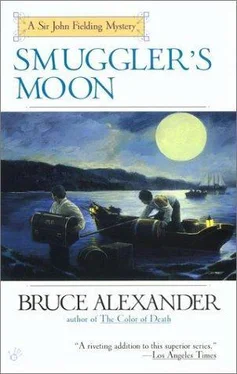Bruce Alexander - Smuggler's Moon
Здесь есть возможность читать онлайн «Bruce Alexander - Smuggler's Moon» весь текст электронной книги совершенно бесплатно (целиком полную версию без сокращений). В некоторых случаях можно слушать аудио, скачать через торрент в формате fb2 и присутствует краткое содержание. Жанр: Исторический детектив, на английском языке. Описание произведения, (предисловие) а так же отзывы посетителей доступны на портале библиотеки ЛибКат.
- Название:Smuggler's Moon
- Автор:
- Жанр:
- Год:неизвестен
- ISBN:нет данных
- Рейтинг книги:4 / 5. Голосов: 1
-
Избранное:Добавить в избранное
- Отзывы:
-
Ваша оценка:
- 80
- 1
- 2
- 3
- 4
- 5
Smuggler's Moon: краткое содержание, описание и аннотация
Предлагаем к чтению аннотацию, описание, краткое содержание или предисловие (зависит от того, что написал сам автор книги «Smuggler's Moon»). Если вы не нашли необходимую информацию о книге — напишите в комментариях, мы постараемся отыскать её.
Smuggler's Moon — читать онлайн бесплатно полную книгу (весь текст) целиком
Ниже представлен текст книги, разбитый по страницам. Система сохранения места последней прочитанной страницы, позволяет с удобством читать онлайн бесплатно книгу «Smuggler's Moon», без необходимости каждый раз заново искать на чём Вы остановились. Поставьте закладку, и сможете в любой момент перейти на страницу, на которой закончили чтение.
Интервал:
Закладка:
“Hmm … well … yes. But tell me, Mr. Bilbo, how is she rigged?”
”Ketch-rigged, she is-main mast and mizzen-which is a considerable improvement over my first down there in the Caribbean, a Barbados sloop. Single-masted, she was. I got one like the Princess here as soon as ever the fortunes of war permitted.”
Thus they toured the ship. At some point, perhaps as I lagged behind and viewed them from a distance, it occurred to me that they made quite a strange pair, so unlike were they. The bearded Black Jack Bilbo, near as wide as he was tall, rolled about on thick, powerful legs, walking a seaman’s walk even there on a steady deck. Sir John, much the taller of the two, walked with the ease and steady gait of a city man; but for the silk band that covered his eyes, he might not have appeared to be blind at all.
Mr. Bilbo did most of the talking. His comments and description of the improvements and repairs upon the ship were well mixed with tales and reminiscences of the sort that only seamen seem to tell to others like themselves. Sir John responded in kind. Though I understood little of it, it pleased me greatly to hear them talk so.
My only disappointment in our visit was that my friend Jimmie Bunkins was not also on hand. We two had been chums since my first days in London. Mr. Bilbo had taken him in hand in much the same way that Sir John had shaped my own life, overseeing his reform and education as a proper father ought to do. Yet there was still in Bunkins something wild. Though he no longer stole as he had during his days as ”a proper village hustler” in and about Covent Garden, he was quick and sharp with his tongue and accepted no nonsense from any quarter. Whatever he had to say made great good sense. In short, he was my best friend.
I wondered that Bunkins was not there with Mr. Bilbo on the deck of the Indian Princess. He had talked of it to me as much and as excitedly as Mr. Bilbo had discussed it with Sir John-nay, more so, I believe. But as I wondered, Jimmie Bunkins made his appearance, and rather a dramatic one it was. He came along seated upon the wagon box of Mr. Bilbo’s coach-and-four. And ‘twas he who drove the team of matched blacks. The regular driver and the coachman sat at either side of him, shouting encouragement as he brought the team and coach to approximately the same place our hackney had stopped and halted them there. It was all done so swiftly and with such dispatch that I, for one, was quite dazzled by Bunkins’s accomplishment. Mr. Bilbo, on the other hand, was less than pleased.
“Next time you come, you’ll be drivin’ them off the dock and into the Thames,” he shouted out to him.
“Aw, Captain,” the driver called back, ”he’s comin’ along fine, he is. Got good hands.”
“He took us clear through town,” the coachman added.
For his part, Bunkins simply chuckled modestly. He had done well, and he knew it. But then did he catch sight of me, and he gave a great wave.
“Jeremy, chum,” he called, ”an’t I quite the driver?”
“You are, and that’s naught but the truth!”
“Don’t encourage him, lad,” said Mr. Bilbo to me. ”His opinion of himself and his abilities is far too high already.”
The appearance of the coach-and-four signaled to Black Jack Bilbo that his day at the dry-dock had ended and that his day at the gaming club would soon begin. (I had heard it said once that Mr. Bilbo slept less than was natural for a man, and I believe this was so.) He assumed rightly that we would travel back from Wapping with him to Number 4 Bow Street. He gathered up the pieces of clothing he had shed against the heat of the day and talked with the foreman about the work remaining to be done. As he did, Bunkins climbed down from his perch high above the horses and jog-trotted across the gangplank to me.
“Hey, chum,” said he, ”an’t this the rummest, grandest thing that ever you saw? A sloop! And the cove says it’s just like the one he plagued the French with.”
(If one or two words I have quoted above are not immediately comprehensible, reader, it is because Bunkins spoke still the patois of the streets surrounding Covent Garden, known as ”flash talk.” A quick, second glance should suffice to reveal their meaning.)
I quite agreed with him, noting only that the cannon seemed to be missing.
“Aye, so they are,” said he. ”And I think it sad, don’t you? There’s nothing like cannon to dress a sloop proper.”
We laughed at that, and then did we begin the sort of banter with which we customarily passed our time together. Not worth repeating, perhaps, but one curious fact, communicated in a whisper, did emerge from our jocular exchanges: Bunkins confided that Mr. Bilbo was told by the Navy office that as a condition of the sale he must remove the thirteen cannon and have them melted down. Though he arranged proof that he had done so through an obliging metal merchant, he had, in fact, secretly stored them against an uncertain future. ”You never know, Jimmie boy, what fate has in store,” he had said to Bunkins.
“You must never tell no one of this, Jeremy,” said Bunkins to me, ”not even your own cove. Otherwise, I’ll never trust you with another secret.”
It was not long until we four were settled in the coach and bouncing along in the proper direction. Sir John and Black Jack Bilbo sat close and talked in low tones. For our part, Bunkins and I sat silent, straining forward to listen to them. What we heard was a report and discussion on the earlier meeting with Lord Mansfield which I had, of course, attended with Sir John. Nevertheless, Sir John’s summary and Mr. Bilbo’s comments were both of interest to me: the former because he managed to present all the facts in the most neutral and least prejudicial manner possible-one would gather from what Sir John said that he simply had as yet no opinion in the matter; and the latter for the very opposite reason-Mr. Bilbo did immediately choose a villain.
“You’ll want to watch out for this man Eccles,” said he to Sir John.
“And why do you advise me so?”
“Because, if you ask me, it’s the customs service that’s corrupt, always has been, always will be so.”
“Oh? And what is it prompts you to say that?”
“Personal experience,” declared Mr. Bilbo. ”It didn’t matter which port I’d bring in a ship and cargo, first person to meet me at the dock was always the customs man. He’d have his hand out, expecting me to pay duty on the cargo, just like I was the regular shipper. And when I’d refuse, they’d seize the cargo of the ship in tow, saying they’d hold on to it until the prize was bought and the buyer had paid the duty. Now, some of these cargoes was perishables-fruit and such like-and what the customs man really wanted was to get it in the customs warehouse so he could sell it out the back door. They was always selling out the back door. ‘Twouldn’t matter where: Kingston, Charleston, Savannah-wherever-even Boston.”
“Good God,” said Sir John, ”what an indictment! All customs men everywhere. Is that what you mean?”
“Oh, I suppose not. Just watch out for that Eccles-that’s all I have to say.”
They talked on, but by now we were well into the city. The Tower of London loomed just ahead, and the street noise had mounted to a pitch comparable to what we knew in Covent Garden. Horses whinnied and clopped, hawkers yelled out in praise of their wares, workmen hammered and shouted. It was quite impossible to hear more, and so Bunk-ins and I sat back during the rest of the journey and relaxed, so far as it is possible for boys of that age to do so.
In his farewell at Number 4 Bow Street, Black Jack Bilbo did lament that Sir John would not be along when he took the Indian Princess out on her test voyage. ”I was countin’ on havin’ you aboard,” said he.
Читать дальшеИнтервал:
Закладка:
Похожие книги на «Smuggler's Moon»
Представляем Вашему вниманию похожие книги на «Smuggler's Moon» списком для выбора. Мы отобрали схожую по названию и смыслу литературу в надежде предоставить читателям больше вариантов отыскать новые, интересные, ещё непрочитанные произведения.
Обсуждение, отзывы о книге «Smuggler's Moon» и просто собственные мнения читателей. Оставьте ваши комментарии, напишите, что Вы думаете о произведении, его смысле или главных героях. Укажите что конкретно понравилось, а что нет, и почему Вы так считаете.












